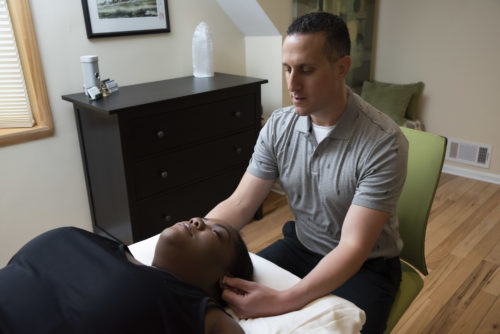 John F Barnes MFR is a manual (hands-on) therapy modality. Because the skin is used as an access point or lever into the fascia (connective tissue system of the body) it is important to be appropriately attired for the work.Men should bring a pair of loose fitting athletic shorts for their treatment sessions. Women should bring loose fitting athletic shorts and a sports bra (or a two-part bathing suit) for treatment.
John F Barnes MFR is a manual (hands-on) therapy modality. Because the skin is used as an access point or lever into the fascia (connective tissue system of the body) it is important to be appropriately attired for the work.Men should bring a pair of loose fitting athletic shorts for their treatment sessions. Women should bring loose fitting athletic shorts and a sports bra (or a two-part bathing suit) for treatment.
This attire is also ideal for allowing the body to move without restriction. Some patients “unwind” while being treated. Unwinding is when the body spontaneously moves during treatment. These movements may be isolated (one limb moving or the neck only moving, as examples) or these may be whole body movements (full body trembling or multiple limbs moving simultaneously, for example). Unwinding allows for incredible self correction and should not be blocked or disallowed by the patient. You’ll hear me say, “if your body wants to move while I’m treating you, absolutely LET IT MOVE.”
It is important to NOT have any lotion or cream on the body/skin. The therapist cannot access the fascia properly via the skin if the skin is slick.
In a typical session we’ll spend a few minutes talking at the beginning, then I’ll assess your posture and tissues, and we’ll spend the remainder of the session hands-on. In some sessions we’ll spend the last few minutes reviewing home exercises and/or learning new home exercises.
Once on the treatment table we will cease talking. Since JFBMFR is a whole body-mind-spirit modality, both patient and therapist must “tune-in” and feel what is happening as tissues release and energy moves throughout the body.
We may dialogue at times during the session but dialoging is different than talking or chit-chatting.
An example of dialoging is:
Therapist: “What are you feeling or experiencing and where?”
Patient: “Even though you’re working at my neck, I’m feeling sensations in my left hip and right hand.”
Therapist: “How would you describe those sensations?”
Patient: “Well, the left hip feels like it feels oftentimes when I tell my wife that my hip is out of whack. The right hand is tingling.”
A few other items of note:
- I will check before beginning the session if the room temperature and table temperature are comfortable.
- We will discuss whether silence or music is best for the session.
- If emotion arises during the session, please fully ALLOW the emotion to express itself (anger, sadness, laughter, anything). Emotion is energy in motion and the uninhibited allowance of it is highly healing and transformative.
- You should drink a full glass of water in the lobby before leaving the clinic. Newly opened tissues are well served by being immediately hydrated.
- Rest in the lobby as long as you wish after the session. Sometimes you may feel “wonky” after a session as you’re processing all the physiological shifts and reorganizations.
 Drink more water than normal after (24-48 hours) each session. Toxins that were trapped in your fascia are now circulating throughout your body and need to be excreted. Increasing your urination will efficiently remove these unbound toxins from your body. You also want to hydrate the released fascia that may have been dehydrated for months, years, or decades. A great book for understanding the importance of proper hydration is Your Body’s Many Cries for Water by Dr. F. Batmanghelidj.
Drink more water than normal after (24-48 hours) each session. Toxins that were trapped in your fascia are now circulating throughout your body and need to be excreted. Increasing your urination will efficiently remove these unbound toxins from your body. You also want to hydrate the released fascia that may have been dehydrated for months, years, or decades. A great book for understanding the importance of proper hydration is Your Body’s Many Cries for Water by Dr. F. Batmanghelidj.- Be mindful of what unfolds the hours, days, and weeks after each session so you can convey that info to me at your next session. Journaling is a wonderful adjunct to your MFR journey and can also be a great memory jogger for when we catch up session to session.
- You may feel fantastic after a session or you may feel not-so-wonderful after a session. If you’re feeling increased discomfort or different sensations after a session you’re likely experiencing what’s called a Healing Response or Healing Crisis. Although this might not feel pleasant, know that it is a reflection of significant positive shifts occurring deep within your body. Drink extra water and allow yourself more rest than you typically do until the discomfort passes.